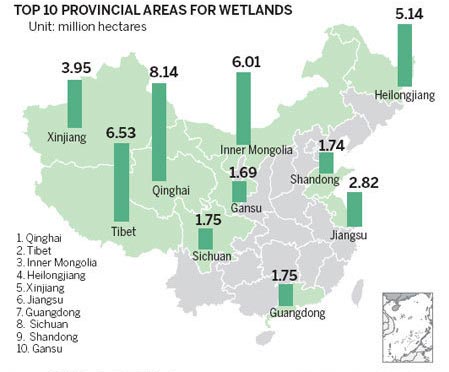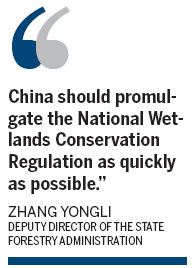Shrinking of wetlands spurs call for regulation
By Yang Yao (China Daily) Updated: 2014-01-14 07:26

He said that an "eco-red line" is needed to prevent overdevelopment of urbanization and industrialization.
Zhang said that total funding of 12.9 million yuan ($2.13 million) from the 12th Five-Year Plan (2011-15) has been prepared by the central and local governments for wetland conservation.
"How to use and supervise the money flow needs to be checked by an independent third party to make sure that the money is used effectively," said Lei Guangchun, a professor from the Chinese Forestry University.
He also urged the establishment of an ecological compensation mechanism.
"Residents of the wetlands need to get economic compensation as they will, more or less, sacrifice either agricultural land or construction land due to conservation," Lei said.
"If they get proper compensation, their motivation to better protect the wetlands will go up."
Companies, communities and NGOs, in addition to governments, should also participate in conservation, said Lei Gang, freshwater director of World Wildlife Fund-China.
"This includes protecting bio-diversity, building a network to protect migratory water birds, etc", he said. "Also it is important to learn cutting-edge technology and cooperate with different departments."
Chen Kelin, China director of Wetlands International, agreed. "Wetlands store a large amount of China's freshwater resources, and receding wetlands will leave less water available in the long term. It plays a key importance in building a resilient society," he said.
- NHTSA says finds no 'defect trend' in Tesla Model S sedans
- WTO rare earth ruling is unfair
- Amway says 2014 China sales may grow 8%
- President Xi in Europe: Forging deals, boosting business
- CNOOC releases 2013 sustainability report
- Local production by Chery Jaguar Land Rover this year
- Car lovers test their need for speed in BMW Mission 3
- China stocks close mixed Monday

















